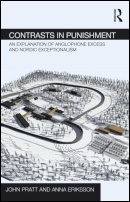Contrasts in Punishment
MEDIA RELEASE
29 January 2013
Contrasts in punishment
A Victoria University researcher has explored the differences in the way modern societies punish offenders and the factors driving punitive and more tolerant approaches to crime and punishment.
In a unique research project that took nearly a decade to complete, Institute of Criminology Professor John Pratt investigated the reasons behind contrasting attitudes to punishment in Anglophone and Nordic societies. His research, carried out in Norway, Finland and Sweden on one hand, and England, Australia and New Zealand on the other, has been published in a new book, Contrasts in Punishment: An Explanation of Anglophone Excess and Nordic Exceptionalism, out now in the Routledge Frontiers of Criminal Justice series.
Professor Pratt says differences between the two clusters of societies are illustrated in their prison rates—the Anglophone countries have some of the highest in the OECD and the Nordic countries some of the lowest.
He says the differences are also seen in prison conditions.
“In the Nordic countries, there is a belief that prison conditions should resemble those in the outside world as much as possible. Norway’s recently opened Halden Prison is a high security jail where every cell has a television, a refrigerator, unbarred windows and designer furniture. The male and female guards are typically unarmed and prisoners complete questionnaires that ask how their prison experience can be improved.”
Time magazine, which interviewed Professor Pratt in 2010, described the prison as the most humane in the world. It has also won contemporary design awards in Norway.
It would be impossible to think of such a prison in the Anglophone countries says Professor Pratt.
“Here, prison administration has come to be dominated by issues of security and control, in conjunction with overcrowded, deteriorating conditions.”
Professor Pratt says the reasons punishment is thought about so differently in the two clusters lies in the pattern of social arrangements developed over the last 200 years.
“The Nordic countries—already very homogeneous—became very socially inclusive and put a high value on moderation, restraint and egalitarianism. In contrast, Anglophone societies became much more exclusionary. They emphasised individual responsibility and the accumulation of wealth and property which led to extensive class and ethnic divisions and barriers.”
He says the differences were further strengthened after 1945 by the development of very different models of welfare state.
“In the Nordic countries, welfare was universal with generous benefits paid for by high taxes. Welfare was much more limited in Anglophone countries—services were mean tested and benefits were at a lower level.”
The result, he says, is that Nordic countries have much higher levels of social capital leading to high levels of trust, self-regulation and strong interdependencies.
“That offsets the need to rely on the penal system to provide social order as is the case in the Anglophone societies.”
He says state power in Nordic countries tends to be used protectively and preventatively in the form of welfare, social and educational provisions.
“In the Anglophone countries, despite all the political emphasis on ‘getting the state out of people’s lives’, there have been few qualms about using state power negatively and punitively against those thought to be unwanted or troublesome.
“In these ways, the exclusionary characteristics of the Anglophone societies have been perpetuated and are reflected in the penal contrasts between the two clusters of societies today.”
Professor Pratt was awarded a Royal Society of New Zealand James Cook Research Fellowship 2009-2012 to carry out his research and a Fellowship at the Straus Institute for Advanced Studies of Law and Justice, New York University 2010-2011.
In addition, he has lectured on his research to audiences in continental Europe, England, South America, the USA and Australia. Earlier publications from the project received the prestigious Sir Leon Radzinowicz Memorial Prize from the Editorial Board of the Brtiish Journal of Criminology in 2009.

ENDS


 The Conversation: ‘Cold Violence’ – A Hidden Form Of Elder Abuse In New Zealand’s Chinese Community
The Conversation: ‘Cold Violence’ – A Hidden Form Of Elder Abuse In New Zealand’s Chinese Community Sport Manawatu: Nominations Open For The 2025 Tararua Sports Awards
Sport Manawatu: Nominations Open For The 2025 Tararua Sports Awards PHCC: Not All Upcycled Food Is Created Equal - What Is Sustainable?
PHCC: Not All Upcycled Food Is Created Equal - What Is Sustainable? Prostate Cancer Foundation: Foundation Hails Select Committee Support For Prostate Screening Pilots
Prostate Cancer Foundation: Foundation Hails Select Committee Support For Prostate Screening Pilots Cross Street Music Festival: First Artists Announced For 2025 Cross Street Music Festival
Cross Street Music Festival: First Artists Announced For 2025 Cross Street Music Festival Bowls New Zealand: Lawson And Grantham Qualify To Keep Bowls Three-Peat Hopes Alive
Bowls New Zealand: Lawson And Grantham Qualify To Keep Bowls Three-Peat Hopes Alive